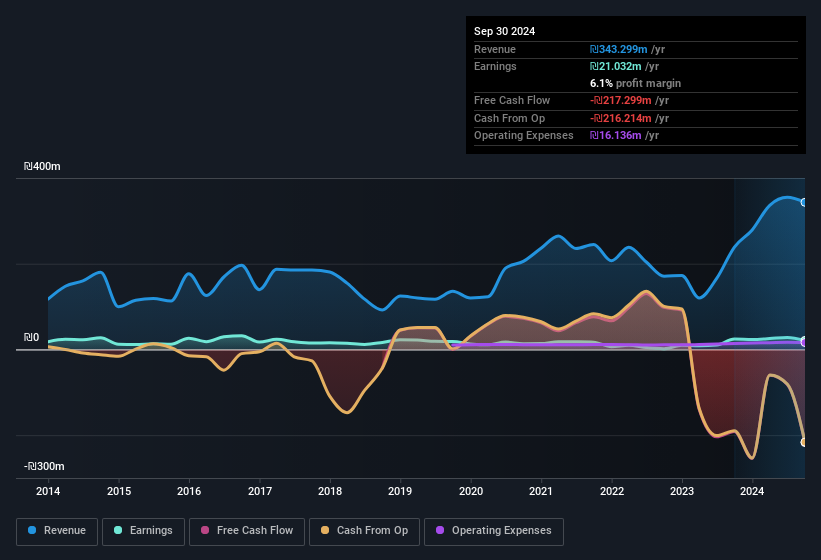- Israel
- /
- Real Estate
- /
- TASE:AVIV
Earnings Troubles May Signal Larger Issues for Mordechai Aviv Taasiot Beniyah (1973) (TLV:AVIV) Shareholders
A lackluster earnings announcement from Mordechai Aviv Taasiot Beniyah (1973) Ltd. (TLV:AVIV) last week didn't sink the stock price. We think that investors are worried about some weaknesses underlying the earnings.
See our latest analysis for Mordechai Aviv Taasiot Beniyah (1973)

A Closer Look At Mordechai Aviv Taasiot Beniyah (1973)'s Earnings
Many investors haven't heard of the accrual ratio from cashflow, but it is actually a useful measure of how well a company's profit is backed up by free cash flow (FCF) during a given period. In plain english, this ratio subtracts FCF from net profit, and divides that number by the company's average operating assets over that period. This ratio tells us how much of a company's profit is not backed by free cashflow.
As a result, a negative accrual ratio is a positive for the company, and a positive accrual ratio is a negative. That is not intended to imply we should worry about a positive accrual ratio, but it's worth noting where the accrual ratio is rather high. That's because some academic studies have suggested that high accruals ratios tend to lead to lower profit or less profit growth.
For the year to September 2024, Mordechai Aviv Taasiot Beniyah (1973) had an accrual ratio of 0.28. We can therefore deduce that its free cash flow fell well short of covering its statutory profit, suggesting we might want to think twice before putting a lot of weight on the latter. Even though it reported a profit of ₪21.0m, a look at free cash flow indicates it actually burnt through ₪217m in the last year. Coming off the back of negative free cash flow last year, we imagine some shareholders might wonder if its cash burn of ₪217m, this year, indicates high risk.
Note: we always recommend investors check balance sheet strength. Click here to be taken to our balance sheet analysis of Mordechai Aviv Taasiot Beniyah (1973).
Our Take On Mordechai Aviv Taasiot Beniyah (1973)'s Profit Performance
Mordechai Aviv Taasiot Beniyah (1973) didn't convert much of its profit to free cash flow in the last year, which some investors may consider rather suboptimal. Therefore, it seems possible to us that Mordechai Aviv Taasiot Beniyah (1973)'s true underlying earnings power is actually less than its statutory profit. But at least holders can take some solace from the 23% per annum growth in EPS for the last three. At the end of the day, it's essential to consider more than just the factors above, if you want to understand the company properly. If you'd like to know more about Mordechai Aviv Taasiot Beniyah (1973) as a business, it's important to be aware of any risks it's facing. For instance, we've identified 4 warning signs for Mordechai Aviv Taasiot Beniyah (1973) (2 are significant) you should be familiar with.
This note has only looked at a single factor that sheds light on the nature of Mordechai Aviv Taasiot Beniyah (1973)'s profit. But there is always more to discover if you are capable of focussing your mind on minutiae. Some people consider a high return on equity to be a good sign of a quality business. So you may wish to see this free collection of companies boasting high return on equity, or this list of stocks with high insider ownership.
New: Manage All Your Stock Portfolios in One Place
We've created the ultimate portfolio companion for stock investors, and it's free.
• Connect an unlimited number of Portfolios and see your total in one currency
• Be alerted to new Warning Signs or Risks via email or mobile
• Track the Fair Value of your stocks
Have feedback on this article? Concerned about the content? Get in touch with us directly. Alternatively, email editorial-team (at) simplywallst.com.
This article by Simply Wall St is general in nature. We provide commentary based on historical data and analyst forecasts only using an unbiased methodology and our articles are not intended to be financial advice. It does not constitute a recommendation to buy or sell any stock, and does not take account of your objectives, or your financial situation. We aim to bring you long-term focused analysis driven by fundamental data. Note that our analysis may not factor in the latest price-sensitive company announcements or qualitative material. Simply Wall St has no position in any stocks mentioned.
About TASE:AVIV
Mordechai Aviv Taasiot Beniyah (1973)
Mordechai Aviv Taasiot Beniyah (1973) Ltd.
Good value with slight risk.
Market Insights
Community Narratives



